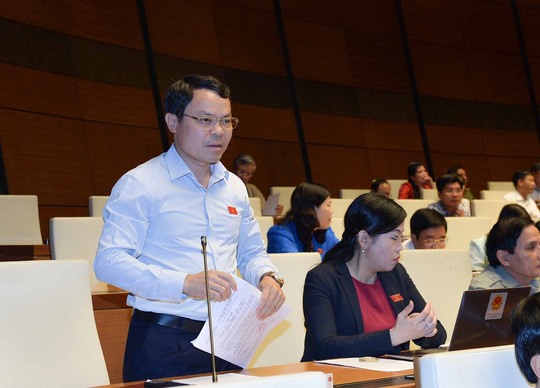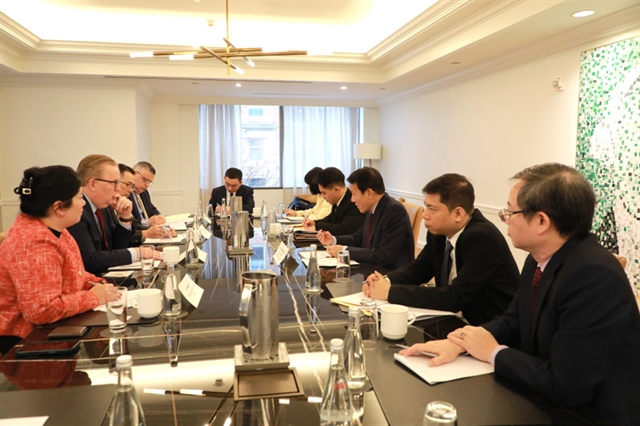 Politics & Law
Politics & Law

Tackling corruption and crime topped the agenda for National Assembly deputies yesterday, with most of them concerned that the tasks were not being fulfilled to required standards.
 |
| Deputy Nguyễn Tiến Sinh from northern Hòa Bình province suggested completing the legal system, particularly regulations like the Penal Code, the Law on Anti-corruption and the Law on Officials and Public Servants. – Photo nld.com.vn |
HÀ NỘI – Tackling corruption and crime topped the agenda for National Assembly deputies yesterday, with most of them concerned that the tasks were not being fulfilled to required standards.
Reporting on anti-corruption work in 2016, Chief Government Inspector Phan Văn Sáu said corruption prevention work has seen positive results and generated visible change in State management, contributing to building an open, transparent and democratic society.
Earlier this year, the Government issued a directive on stepping up the detection and handling of corruption cases. The Central Steering Committee for Corruption Prevention and Combat monitored investigations, legal proceedings, prosecution and trials of important corruption cases, he said.
Through inspections and the settlement of petitions and denunciations, inspection agencies uncovered 49 corruption cases and 95 individuals associated with corrupt behaviour. Between October 1, 2015 and September 30, 2016, police launched investigations into 257 cases with 710 people involved in corruption.
However, he admitted that the menace was growing in a complex fashion, as anti-corruption work was not taken seriously by all ministries, sectors and localities.
In 2016, corruption cases triggered economic losses of over VNĐ240 billion (US$10.8 million), he reported.
Sáu vowed that agencies will work harder to stamp out corruption. The whole political system is responsible for combating corruption, with Party committees, administrations and heads of offices front and centre in the effort.
Discussing the report, most deputies agreed with the report but said more measures were needed to increase the efficiency of anti-corruption work. Current anti-corruption measures were not strict enough to serve as effective deterrents, they said.
Deputy Nguyễn Tiến Sinh from northern Hòa Bình province suggested completing the legal system, particularly regulations like the Penal Code, the Law on Anti-corruption and the Law on Officials and Public Servants.
Every public official should have their assets closely supervised like other countries have done successfully, he said. For example, China asked public officials to declare assets twice a year while Singapore allows courts to seize assets that public officials could not declare the origin of.
Deputy Trương Trọng Nghĩa from HCM City pointed to the need to clarify the responsibility of heads of agencies and localities where corruption was found.
Other deputies proposed more measures to promote the role of the public in detecting corruption and to protect whistleblowers.
Reporting on crime prevention, Minister of Public Security Tô Lâm said the Government issued drastic instructions and ministries, sectors, localities and society made concerted efforts to combat crime in 2016.
Police smashed 4,172 criminal rings disturbing social order, tackled cases of serious crime and helped bring to light big corruption cases.
Despite these efforts, complicated crimes were still reported, mostly in traffic law, fire prevention, environmental protection, food hygiene, finance, taxation, land, trade and insurance, he said.
He added that hostile forces incited mass gatherings causing social disturbances.
He said that economic difficulties and unemployment put huge pressure on society and State management was weak, especially in finance, taxation, transport, and food hygiene. Party committees and authorities of several localities lacked a hard-line attitude in preventing and combating crimes.
Examining the report, many deputies said the Government needed stronger measures to combat crime, particularly juvenile delinquency, such as raising awareness of youths to abide by law and the consequences of crime, increasing co-operation between families, schools and society in educating youths and completing the legal system to prevent loopholes.
Deputies also listened to reports presented by Chief of the Supreme People’s Procuracy Lê Minh Trí, Chief Justice of the Supreme People’s Court Nguyễn Hòa Bình, and Justice Minister Lê Thành Long on criminal and civil cases. — VNS




